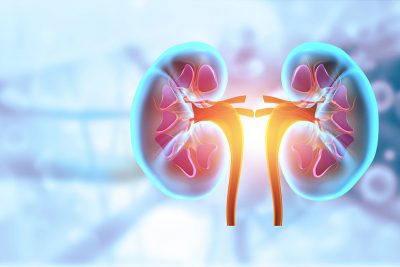
Atrasentan Tablets (Vanrafia)
May 30, 2025
By William Elliott, MD, FACP, and James Chan, PharmD, PhD
The U.S. Food and Drug Administration (FDA) has approved atrasentan, the first selective endothelin A receptor (ETAR) antagonist to reduce proteinuria in adults with immunoglobulin A nephropathy. It was approved under accelerated approval based on surrogate outcome. Continued approval may be contingent on verification of clinical benefit in a confirmatory clinical trial.1 It is the second drug to be granted an accelerated approval for this indication, after iptacopan (Fabhalta), a complement inhibitor. Atrasentan is distributed by Novartis Pharmaceuticals Corporation as Vanrafia.
Indications
Atrasentan is indicated to reduce proteinuria in adults with primary immunoglobulin A nephropathy (IgAN) at risk of rapid disease progression, generally a urine protein-to-creatinine ratio (UPCR) ≥ 1.5 g/g.1
Dosage
The recommended dose is 0.75 mg orally once daily with or without food.1 Atrasentan is available as 0.75-mg tablets.
Potential Advantages
Atrasentan is a highly selective inhibitor for endothelin receptor A.2 In contrast to sparsentan, an ETAR antagonist and angiotensin-aldosterone inhibitor, it does not carry a box warning for hepatotoxicity or enrollment in a risk evaluation and mitigation strategies (REMS) program.
Potential Disadvantages
It remains to be established if treatment with atrasentan results in a reduction in the decline in glomerular filtration rate (eGFR). Based on animal studies, atrasentan may cause major birth defects if used during pregnancy.1 Use of effective contraception is advised before initiation of, during, and for two weeks after discontinuation of treatment.1 It may cause an elevation of aminotransferases, fluid retention, decreased sperm counts, hypotension, and decreased hemoglobin levels.1 Atrasentan is a substrate for CYP3A and organic anion transporting polypeptide (OATP) 1B1/1B3. Concomitant use of strong or moderate inducers of the former and inhibitors of the latter should be avoided.1
Comments
Activation of ETAR is seen in kidney disease caused by multiple etiologies, including IgAN. It causes sustained vasoconstriction of the afferent arterioles to the kidneys, producing deleterious effects, such as hyperfiltration, podocyte damage, proteinuria, and (eventually) GFR decline.2 ETAR antagonists may have the potential to slow this progression.
The effect of atrasentan was evaluated in an ongoing, randomized, double-blind, placebo-controlled study (ALIGN) in adult study participants with biopsy-proven primary IgAN.1,3 Participants had an eGFR ≥ 30 mL/min/1,73 m2 and urine protein ≥ 1 g/day on a stable dose of maximally tolerated renin angiotensin system inhibitor. At baseline, the mean baseline eGFR was 59 mL/min/1.73 m2, geometric mean baseline UPCR was 1.5 g/g from a 24-hour urine sample, and 15% had proteinuria > 3.5 g/day. The mean participant age was 45 years (19 to 77 years), 59% were male, 57% were Asian, and 36% were white. Seventy-one percent were taking an angiotensin II receptor antagonist only.
Participants were randomized to atrasentan or placebo in addition to supportive care. Rescue immunosuppressive treatment could be initiated per investigator discretion. Efficacy was assessed based on the first 270 participants (135 in each group) who reached the week 36 visit.
The primary efficacy endpoint was the percent reduction in UPCR at week 36 from baseline. Atrasentan produced a 38% reduction (compared to 3% for the placebo arm), an ageometric mean difference of 36.1% (95% confidence interval [CI], -44.5% to -26.4%). Changes from baseline were observed at the six-week visit and sustained through week 36. An exploratory cohort of 64 participants on a stable dose of sodium-glucose cotransporter 2 (SGLT2) inhibitor was randomized separately and analyzed. The results were -39.6% for atrasentan, compared to -3.4% for placebo.3
Clinical Implications
IgAN is a progressive autoimmune disease and the most common form of primary glomerular disease. It is a major cause of kidney failure worldwide. Although life expectancy may not be altered for many patients, 50% of adult patients will progress to renal failure or death, especially those with onset at younger than 50 years of age.4 Initial treatment is renin-angiotensin blockade, lifestyle modification, and supportive care.5 Immunosuppressive therapy may be considered.
Currently, there are three newer FDA-approved treatments — iptacopan,
delayed-release budesonide, and sparsentan. Both iptacopan and atrasentan were granted accelerated approvals based on reduction of proteinuria. Budesonide and sparsentan have been shown to slow the rate of eGFR decline.6,7 The eGFR data for atrasentan are expected in 2026 after completing week 136.3 Sparsentan has a box warning for hepatotoxicity and embryo-toxicity, and iptacopen has one for serious infections caused by encapsulated bacteria. Both require enrollment in a REMS program, whereas atrasentan does not. Atrasentan has a wholesale acquisition cost of $162,500 annually.
References
- Novartis Pharmaceutical Corporation. Vanrafia prescribing information. Revised April 2025. https://www.accessdata.fda.gov/drugsatfda_docs/label/2025/219208s000lbl.pdf
- Martínez-Díaz I, Martos N, Llorens-Cebrià, et al. Endothelin receptor antagonists in kidney disease. Int J Mol Sci. 2023;;24(4):3427.
- Heerspink HJ, Jardine M, Kohan DE, et al. Atrasentan in patients with IgA nephropathy. N Engl J Med. 2025;392(6):544-554.
- Pitcher D, Braddon F, Hendry B, et al. Long-term outcomes in IgA nephropathy. Clin J Am Soc Nephrol. 2023;18(6):727-738.
- Kidney Disease Improving Global Outcomes (KDIGO) Glomerular Disease Work Group. KDIGO 2021 Clinical Practice Guideline for the Management of Glomerular Diseases. Kidney Int. 2021;100(4S):S1-S276.
- Lafayette R, Kristensen J, Stone A, et al. Efficacy and safety of a targeted-release formulation of budesonide in patients with primary IgA nephropathy (NefIgArd): 2-year results from a randomised phase 3 trial. Lancet. 2023;402(10405):859-870.
- Rovin BH, Barratt J, Heerspink HJL, et al. Efficacy and safety of sparsentan versus irbesartan in patients with IgA nephropathy (PROTECT): 2-year results from a randomised, active-controlled, phase 3 trial. Lancet. 2023;402(10417):2077-2090.